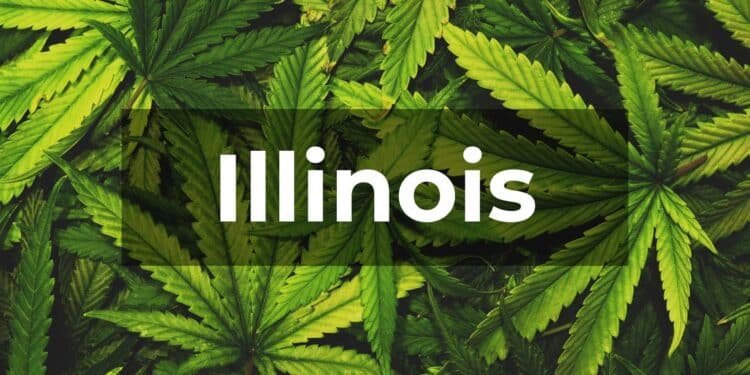Illinois has made significant progress in marijuana legislation in recent years. In 2014, the state legalized medical marijuana, and in 2019, it became the 11th state to legalize recreational use of the drug for adults aged 21 and over. However, it’s important to understand the laws and regulations surrounding marijuana use in Illinois to avoid any legal issues.
In this section, we provide an overview of the current state of marijuana legality in Illinois. We’ll discuss the laws governing both medical and recreational marijuana use, possession, and sale, as well as any important regulations or restrictions that users should be aware of. Let’s dive in and explore the ins and outs of marijuana use in Illinois.
Marijuana Legalization in Illinois: A Brief History
Illinois’ marijuana laws have undergone significant change over the past few decades. Prior to 2013, marijuana was illegal for all uses in Illinois. However, in 2013, Governor Pat Quinn signed the Compassionate Use of Medical Cannabis Pilot Program Act, which legalized medical marijuana use for qualifying patients.
Following the success of the state’s medical marijuana program, efforts to legalize recreational marijuana gained traction. In 2019, Governor J.B. Pritzker signed the Cannabis Regulation and Tax Act into law, legalizing recreational marijuana use for adults over the age of 21.
The path to marijuana legalization in Illinois was not always smooth. There were multiple attempts to legalize marijuana through legislation before the final bill was passed. In 2017, a bill to legalize marijuana failed to pass the Illinois Senate. In 2018, a bill made it to the Illinois House of Representatives but was not brought to a vote. Finally, in 2019, a comprehensive marijuana legalization bill passed both the Illinois House and Senate before being signed into law by Governor Pritzker.
Marijuana Legalization in Illinois: A Brief History.
The legalization of marijuana in Illinois was the result of years of advocacy and public support, as well as recognition of the benefits of legalizing and regulating marijuana. The legalization and regulation of marijuana have created new economic opportunities and provided relief to many individuals who suffer from medical conditions that can be treated with marijuana.
Medical Marijuana in Illinois: Who Qualifies?
Illinois state law allows the use of medical marijuana for patients who suffer from specific medical conditions. The Illinois Department of Public Health (IDPH) oversees the state’s medical marijuana program and is responsible for administering IDPH-issued registry identification cards to eligible patients.
Qualifying conditions for medical marijuana use in Illinois include:
- Cancer
- Glaucoma
- HIV/AIDS
- Hepatitis C
- Crohn’s disease
- Post-Traumatic Stress Disorder (PTSD)
- Multiple Sclerosis
- Spinal cord injury or disease
- Tourette’s syndrome
- Any terminal illness with a prognosis of less than six months to live
- Rheumatoid arthritis
- Any other debilitating medical condition as determined by a physician’s judgment that the use of medical cannabis would outweigh the potential health risks.
Patients who suffer from one or more of these conditions can apply for a medical marijuana card through the IDPH website. The application process involves providing medical documentation that confirms the diagnosis of the condition and a completed physician certification form. Once approved, patients receive a registry identification card that allows them to purchase medical cannabis at licensed dispensaries.
Medical cannabis is available in a variety of forms in Illinois, including capsules, tinctures, oils, and edibles. Patients can also purchase marijuana flowers for vaporization or smoking. It is important to note that smoking marijuana is not allowed in public places in Illinois and is subject to the same penalties as smoking tobacco in public places.
Physicians who prescribe medical cannabis for patients are required to register with the state and comply with specific regulations around medical marijuana use. This includes monitoring patients for potential side effects and drug interactions and ensuring that patients do not abuse or divert their medication.
Conclusion
If you suffer from a qualifying medical condition, medical marijuana may provide relief from symptoms and improve your quality of life. Be sure to consult with your physician and understand the rules and regulations around medical cannabis before applying for a registry identification card.
Possessing Marijuana in Illinois: What are the Laws?
In Illinois, it is legal for adults who are 21 years of age or older to possess up to 30 grams of marijuana. However, it is important to note that possession outside one’s personal space, such as in a vehicle or public space, is subject to different laws and regulations. Individuals found in possession of marijuana while driving a vehicle may face serious legal consequences.
It is also illegal to possess any amount of marijuana near a school, regardless of whether or not it is being used for personal consumption. The possession of marijuana on school grounds or within 1,000 feet of a school may result in a fine of up to $2,500 or up to a year in jail.
| Possession Limits | Penalties |
|---|---|
| 30 grams or less | Fine of $100 – $200 |
| More than 30 grams to 100 grams | Misdemeanor, up to 6 months in jail, and/or a fine of $500 – $1,500 |
| More than 100 grams to 500 grams | Felony, 1 – 3 years in jail, and/or a fine of $1,000 – $25,000 |
| More than 500 grams to 2,000 grams | Felony, 2 – 5 years in jail, and/or a fine of $2,500 – $25,000 |
| More than 2,000 grams | Felony, 3 – 7 years in jail, and/or a fine of $25,000 |
It is also important to note that individuals who are found in possession of marijuana while on parole or probation may face additional legal consequences, as the use of marijuana is typically prohibited while serving such sentences.
When it comes to the consumption of marijuana in public, it is illegal and may result in a fine of up to $100. While there are some public spaces, such as designated smoking areas, where consumption is allowed, it is important to be aware of the specific rules and regulations governing each space.
Selling Marijuana in Illinois: What are the Regulations?
If you’re interested in selling marijuana in Illinois, you’ll need to navigate a complex regulatory landscape. Here are some of the key regulations you should be aware of:
| License requirements | Restrictions on advertising and marketing | Quality control and safety testing guidelines |
|---|---|---|
| In order to operate a marijuana business in Illinois, you’ll need to obtain a license from the Illinois Department of Financial and Professional Regulation. There are several different types of licenses available, including cultivation, processing, transportation, and dispensary licenses. | Under Illinois law, marijuana businesses are subject to strict rules around advertising and marketing. For example, businesses are not allowed to use cartoons or other imagery that might appeal to children, and they cannot make any claims about the health benefits of marijuana. | One of the goals of Illinois’ marijuana regulations is to ensure that all products are safe for consumers to use. To that end, all marijuana products must be tested and approved by a laboratory that is licensed by the state. This testing process includes checks for potency, contaminants, and other factors that could affect the safety or quality of the product. |
It’s worth noting that the state of Illinois has placed a cap on the number of licenses that will be issued for each type of marijuana business. The goal of this cap is to prevent over-saturation of the market and to give a fair chance to smaller businesses that might otherwise be squeezed out by larger competitors. As a result, competition for marijuana licenses can be fierce.
Despite the challenges involved, the marijuana industry in Illinois has the potential to be highly lucrative. According to some estimates, the industry could generate up to $1 billion in annual revenue for the state once it is fully established.
If you’re interested in starting a marijuana business in Illinois, it’s important to do your research and understand the regulations that apply to your specific situation. Consulting with a lawyer or other expert in the field can also be helpful.
Recreational Marijuana in Illinois: What You Need to Know
If you’re considering using recreational marijuana in Illinois, there are a few important things you need to know before you begin. While it may be legal for adults over the age of 21 to possess and use marijuana, there are still rules and regulations in place to ensure its safe consumption.
Legal Limits for Possession
The legal limit for possession of marijuana in Illinois is 30 grams for flower, 500 milligrams for THC-infused products, and 5 grams for concentrates. It’s important to note that it is still illegal to possess marijuana on federal land, such as national parks or military installations.
Consumption and Smoking
While it is legal to possess and use marijuana in Illinois, smoking or consuming it in public places is prohibited. This includes sidewalks, parks, and most outdoor spaces. It is also illegal to use marijuana while operating a vehicle, bike, or boat. It’s recommended to consume marijuana in a private residence or a designated smoking area.
Forms of Marijuana Products
Recreational users in Illinois have access to a range of marijuana products. These include traditional flower or bud, edibles, concentrates, tinctures, and topicals. It’s important to understand the potency of each product and to start with a low dose to avoid overconsumption.
Risks and Benefits of Recreational Marijuana Use
While recreational marijuana use can provide benefits such as relaxation, pain relief, and improved mood, it’s important to be aware of potential risks as well. These can include impaired coordination, increased heart rate, and impaired judgment. It’s recommended to use marijuana responsibly and to avoid mixing it with other substances.
Overall, if you’re considering using recreational marijuana in Illinois, be sure to educate yourself on the laws and regulations surrounding its use and consumption. By using it responsibly and within legal limits, you can enjoy the benefits of marijuana while staying safe and compliant.
DUI and Marijuana in Illinois: What are the Consequences?
If you are caught driving under the influence of marijuana in Illinois, you could face serious consequences. The state has strict laws in place to deter impaired driving and protect the safety of other drivers on the road.
Under Illinois law, it is illegal to operate a motor vehicle while under the influence of any amount of marijuana. This includes both recreational and medical marijuana use. If you are pulled over and found to have THC in your system, you could face criminal charges for DUI.
| Offense | Possible Consequences |
|---|---|
| First Offense | A suspended driver’s license for up to six months, up to one year probation, and possible imprisonment for up to one year. Fines can range up to $2,500. |
| Second Offense | A suspended driver’s license for up to five years, up to 48 months probation, and possible imprisonment for up to five years. Fines can range up to $2,500. |
| Third Offense | A revoked driver’s license for up to 10 years, up to 48 months probation, and possible imprisonment for up to seven years. Fines can range up to $2,500. |
It is worth noting that Illinois has a zero-tolerance policy for drivers under 21 who are caught driving under the influence of marijuana. Even a trace amount of THC in the bloodstream can result in a DUI charge and potential license suspension.
If you are a medical marijuana patient, it is important to be aware that using cannabis does not give you a free pass to drive impaired. Even if you have a valid medical marijuana card, you could still be charged with DUI if you are caught driving under the influence.
Remember, driving under the influence of marijuana is not only illegal, it’s also dangerous and puts your own life and the lives of others at risk. Always use marijuana responsibly and never get behind the wheel while impaired.
Marijuana and Employment in Illinois: How Do Employers Handle It?
As marijuana laws continue to evolve in Illinois, many employees and employers may be wondering how these changes will affect the workplace. While medical marijuana has been legal in Illinois since 2013, the legalization of recreational marijuana in 2020 has raised new questions and concerns around drug testing and workplace policies.
Drug Testing
Employers in Illinois are still allowed to drug test their employees, even for marijuana use, and can discipline or terminate employees who test positive. However, employers must follow specific testing protocols and cannot discriminate against employees who use medical marijuana and have a valid registration card.
It’s important to note that while drug tests can detect the presence of THC in a person’s system, this doesn’t necessarily indicate impairment or recent use. THC can remain in a person’s system for weeks after use, making it difficult to determine whether an employee is currently under the influence on the job.
Workplace Policies
Employers in Illinois can still enforce zero-tolerance policies for drug use in the workplace, even for legal marijuana use. However, these policies must be clearly communicated to employees and applied consistently across the board. It’s also important to ensure that workplace policies comply with all applicable laws and regulations.
Employees who use medical marijuana should communicate with their employer to discuss any accommodations that may be necessary, such as adjusting work schedules or duties. Employers are required to make reasonable accommodations for employees with disabilities, including those who use medical marijuana.
Legal Protections
While Illinois law provides some protections for medical marijuana users, there is currently no legal protection for recreational marijuana users in the workplace. Employers can still discipline or terminate employees who test positive for marijuana, even if it was consumed legally outside of work. However, some advocacy groups and lawmakers are pushing for greater protections for recreational users in the workplace.
It’s important for both employers and employees to stay up to date on the latest marijuana laws and regulations in Illinois, and to communicate openly and honestly about any concerns or questions they may have.
Marijuana and Minors in Illinois: What are the Laws?
When it comes to marijuana use by minors in Illinois, there are strict laws and regulations in place. Under Illinois law, it is illegal for anyone under the age of 21 to possess, use, or purchase marijuana, whether for medical or recreational purposes. Violating these laws can result in criminal penalties and other consequences.
While medical marijuana use is legal for patients of any age with a qualifying medical condition, minors must have a parent or legal guardian registered as their designated caregiver in order to obtain and use medical marijuana. The caregiver must also meet certain requirements and undergo a background check.
Protecting Minors from Marijuana Use
Illinois is committed to preventing underage marijuana use and has implemented a number of measures to protect minors. These include:
- Prohibiting the sale of marijuana or marijuana-infused products to minors
- Requiring all marijuana dispensaries to have strict security measures in place to prevent underage access
- Requiring marijuana packaging to be child-resistant and labeled with a warning about the potential risks
- Investing in education and prevention programs to help minors understand the risks and consequences of marijuana use
Parents and guardians also have an important role to play in preventing underage marijuana use. By talking openly with their children about the risks and setting clear expectations, parents can help their children make informed and responsible choices.
“It’s important for parents to be open and honest with their children about the potential risks of marijuana use. By having these conversations early and often, parents can help their children make smart choices and avoid the consequences of underage use.”
Penalties for Underage Marijuana Use
Under Illinois law, minors who are caught possessing, using, or purchasing marijuana can face a number of penalties, including:
| Offense | Penalty |
|---|---|
| First offense | Class A misdemeanor, community service, and/or drug education |
| Second offense | Class 4 felony, probation, and/or drug education |
| Third or subsequent offense | Class 3 felony, probation, and/or drug education |
In addition to these criminal penalties, minors who are caught using marijuana may also face other consequences, such as suspension of their driver’s license or revocation of certain privileges, such as the ability to participate in school sports or extracurricular activities.
Conclusion
When it comes to marijuana use by minors in Illinois, it is important to understand the laws and regulations in place to protect young people from the potential risks associated with marijuana use. By working together to prevent underage use and promoting responsible behavior, we can help ensure the health and safety of our communities.
Legalizing Marijuana in Illinois: Pros and Cons
As with any controversial issue, there are both pros and cons to legalizing marijuana in Illinois. Here, we summarize the main arguments on both sides of the debate.
Pros of Legalizing Marijuana in Illinois
- Increased tax revenue: Legalizing marijuana would create a new source of tax revenue for the state, which could be used to fund education, infrastructure, and other public services.
- Reduced incarceration rates: Current marijuana laws can lead to unfair and disproportionate incarceration rates, particularly for marginalized communities. Legalizing marijuana would help to reduce the number of people being unfairly punished for non-violent offenses.
- Improved public health outcomes: Legalizing marijuana would allow for greater regulation and quality control of products, reducing the likelihood of contaminated or dangerous substances being sold on the black market. It would also allow for greater education and public health campaigns around responsible use.
Cons of Legalizing Marijuana in Illinois
- Increased use: Legalizing marijuana could lead to an increase in overall use, particularly among minors and vulnerable populations.
- Impaired driving: Marijuana can impair driving ability, and legalizing it could lead to more people driving under the influence.
- Addiction: While marijuana is not as addictive as some other substances, it can still be habit-forming and lead to negative consequences for some users.
Ultimately, the decision on whether to legalize marijuana in Illinois is a complex and multifaceted one. It requires careful consideration of the potential benefits and risks, as well as the values and priorities of the state and its citizens.
Frequently Asked Questions about Marijuana in Illinois
Curious about marijuana laws in Illinois? Here are some of the most frequently asked questions about marijuana use, possession, and sale in the state:
What are the legal limits for possession?
Adults aged 21 or older can possess up to 30 grams of cannabis flower, 500mg of THC in a cannabis-infused product, or 5 grams of cannabis concentrate. Medical marijuana patients can possess up to 2.5 ounces of cannabis every 14 days.
Can I grow my own marijuana?
Yes, adults aged 21 or older can grow up to five plants per household for personal use. However, the plants cannot be visible from public spaces and must be in a locked area.
How can I apply for a medical marijuana card?
To apply for a medical marijuana card, you must have a qualifying condition and obtain a certification from a physician. You will then need to submit an application with the Illinois Department of Public Health and pay a fee.
Where can I use marijuana?
Marijuana can be used on private property, but not in public places like parks, streets, or sidewalks. It is also illegal to use marijuana in a motor vehicle, even as a passenger.
Can I be fired for using marijuana?
Employers in Illinois have the right to enforce drug-free workplace policies and can prohibit marijuana use among employees. Therefore, it is possible to be fired for using marijuana even if it is legal.
We hope these frequently asked questions answered some of your inquiries about marijuana in Illinois. Remember, it’s always essential to stay informed about current laws and regulations to ensure safe and legal use.














